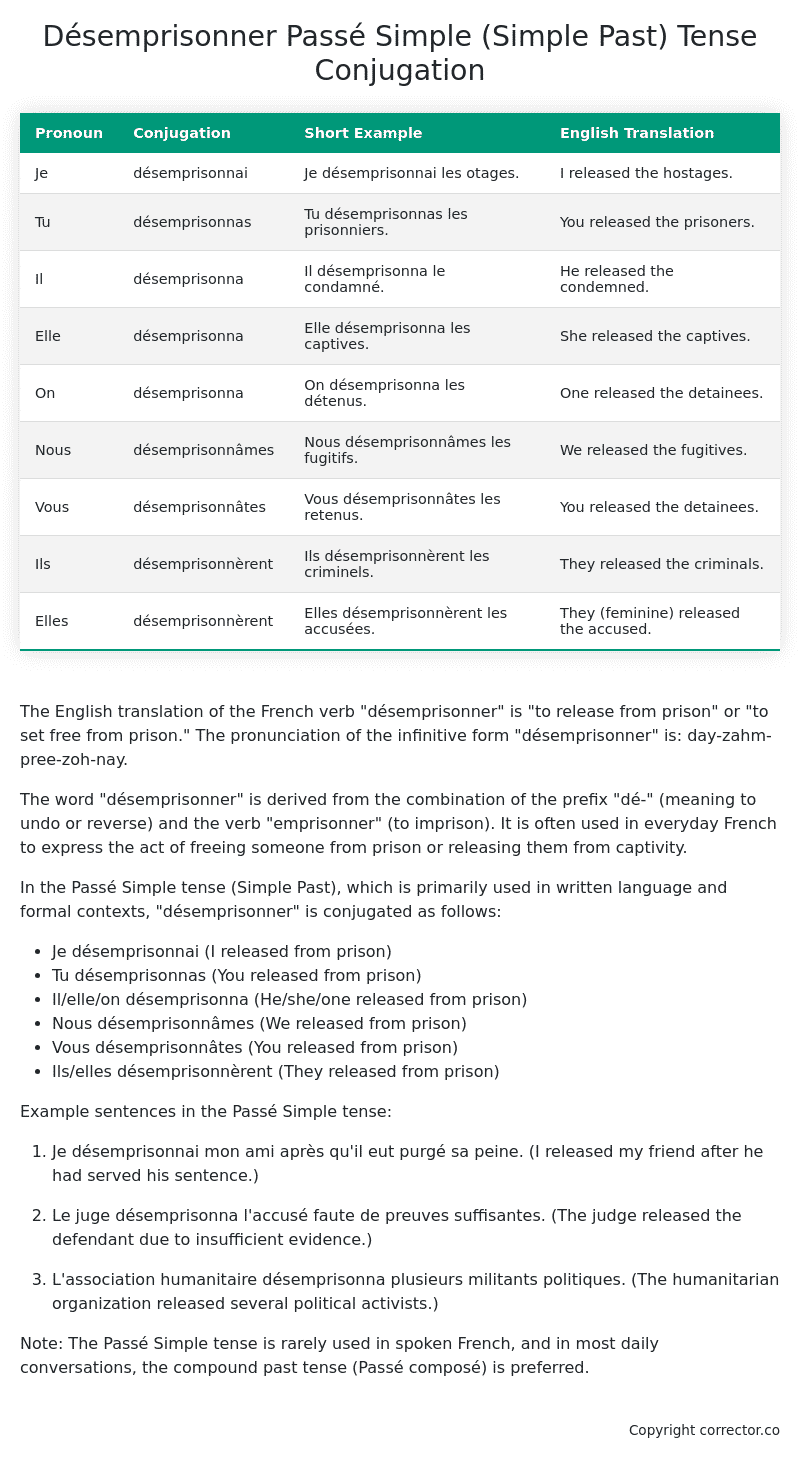Passé Simple (Simple Past) Tense Conjugation of the French Verb désemprisonner
Introduction to the verb désemprisonner
The English translation of the French verb “désemprisonner” is “to release from prison” or “to set free from prison.” The pronunciation of the infinitive form “désemprisonner” is: day-zahm-pree-zoh-nay.
The word “désemprisonner” is derived from the combination of the prefix “dé-” (meaning to undo or reverse) and the verb “emprisonner” (to imprison). It is often used in everyday French to express the act of freeing someone from prison or releasing them from captivity.
In the Passé Simple tense (Simple Past), which is primarily used in written language and formal contexts, “désemprisonner” is conjugated as follows:
- Je désemprisonnai (I released from prison)
- Tu désemprisonnas (You released from prison)
- Il/elle/on désemprisonna (He/she/one released from prison)
- Nous désemprisonnâmes (We released from prison)
- Vous désemprisonnâtes (You released from prison)
- Ils/elles désemprisonnèrent (They released from prison)
Example sentences in the Passé Simple tense:
-
Je désemprisonnai mon ami après qu’il eut purgé sa peine.
(I released my friend after he had served his sentence.) -
Le juge désemprisonna l’accusé faute de preuves suffisantes.
(The judge released the defendant due to insufficient evidence.) -
L’association humanitaire désemprisonna plusieurs militants politiques.
(The humanitarian organization released several political activists.)
Note: The Passé Simple tense is rarely used in spoken French, and in most daily conversations, the compound past tense (Passé composé) is preferred.
Table of the Passé Simple (Simple Past) Tense Conjugation of désemprisonner
| Pronoun | Conjugation | Short Example | English Translation |
|---|---|---|---|
| Je | désemprisonnai | Je désemprisonnai les otages. | I released the hostages. |
| Tu | désemprisonnas | Tu désemprisonnas les prisonniers. | You released the prisoners. |
| Il | désemprisonna | Il désemprisonna le condamné. | He released the condemned. |
| Elle | désemprisonna | Elle désemprisonna les captives. | She released the captives. |
| On | désemprisonna | On désemprisonna les détenus. | One released the detainees. |
| Nous | désemprisonnâmes | Nous désemprisonnâmes les fugitifs. | We released the fugitives. |
| Vous | désemprisonnâtes | Vous désemprisonnâtes les retenus. | You released the detainees. |
| Ils | désemprisonnèrent | Ils désemprisonnèrent les criminels. | They released the criminals. |
| Elles | désemprisonnèrent | Elles désemprisonnèrent les accusées. | They (feminine) released the accused. |
Other Conjugations for Désemprisonner.
Le Present (Present Tense) Conjugation of the French Verb désemprisonner
Imparfait (Imperfect) Tense Conjugation of the French Verb désemprisonner
Passé Simple (Simple Past) Tense Conjugation of the French Verb désemprisonner (You’re reading it right now!)
Passé Composé (Present Perfect) Tense Conjugation of the French Verb désemprisonner
Futur Simple (Simple Future) Tense Conjugation of the French Verb désemprisonner
Futur Proche (Near Future) Tense Conjugation of the French Verb désemprisonner
Plus-que-parfait (Pluperfect) Tense Conjugation of the French Verb désemprisonner
Passé Antérieur (Past Anterior) Tense Conjugation of the French Verb désemprisonner
Futur Antérieur (Future Anterior) Tense Conjugation of the French Verb désemprisonner
Subjonctif Présent (Subjunctive Present) Tense Conjugation of the French Verb désemprisonner
Subjonctif Passé (Subjunctive Past) Tense Conjugation of the French Verb désemprisonner
Subjonctif Imparfait (Subjunctive Imperfect) Tense Conjugation of the French Verb désemprisonner
Conditionnel Présent (Conditional Present) Tense Conjugation of the French Verb désemprisonner
Conditionnel Passé (Conditional Past) Tense Conjugation of the French Verb désemprisonner
Conditionnel Passé II (Conditional Past II) Tense Conjugation of the French Verb désemprisonner
L’impératif Présent (Imperative Present) Tense Conjugation of the French Verb désemprisonner
L’impératif Passé (Imperative Past) Tense Conjugation of the French Verb désemprisonner
L’infinitif Présent (Infinitive Present) Tense Conjugation of the French Verb désemprisonner
L’infinitif Passé (Infinitive Past) Tense Conjugation of the French Verb désemprisonner
Le Participe Présent (Present Participle) Tense Conjugation of the French Verb désemprisonner
Le Participe Passé (Past Participle) Tense Conjugation of the French Verb désemprisonner
Struggling with French verbs or the language in general? Why not use our free French Grammar Checker – no registration required!
Get a FREE Download Study Sheet of this Conjugation 🔥
Simply right click the image below, click “save image” and get your free reference for the désemprisonner Passé Simple tense conjugation!

Désemprisonner – About the French Passé Simple (Simple Past) Tense
Formation
Usage
Narration
Historical Context
Interactions with other tenses
Passé Composé
Imparfait
Conditional and Subjunctive
Summary
I hope you enjoyed this article on the verb désemprisonner. Still in a learning mood? Check out another TOTALLY random French verb conjugation!


